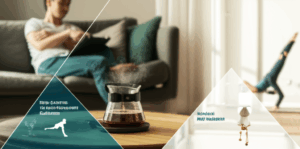As the vibrant hues of autumn begin to paint the landscape, there’s a distinct feeling of a “fall reboot” in the air. This season, often associated with new beginnings and renewed focus, presents an ideal opportunity to re-evaluate and revamp your routines, whether you’re a student embarking on new courses or a staff member tackling fresh projects. The transition from the relaxed pace of summer to the structured demands of fall can be challenging, but with intentional strategies, it’s possible to cultivate habits that foster productivity, well-being, and academic or professional success. Insights from university faculty and staff across various institutions highlight the importance of proactive planning and self-care during this pivotal time.

Mastering Time Management and Productivity for the Fall Semester
Effective time management is the cornerstone of a successful fall. For both students and professionals within the university setting, juggling multiple responsibilities requires strategic planning and disciplined execution.
Set Clear, Achievable Goals
Before diving into the semester, take time to define what you hope to accomplish. Whether it’s excelling in a particular course, launching a new initiative, or improving a specific skill, clear goals provide direction and motivation. Break down larger aspirations into smaller, manageable tasks with realistic deadlines. This approach prevents overwhelm and provides a clear roadmap for your academic or professional journey.
Craft a Detailed Schedule and Utilize Planning Tools
A well-structured schedule is crucial. Integrate all commitments, including classes, meetings, study blocks, work hours, and personal appointments, into a calendar or planner. Many experts recommend electronic calendars for their ease of coordination and reminder functions. Consider your natural productivity rhythms when allocating time; if you’re a morning person, schedule demanding tasks for those hours.
Implement Time Blocking and Single-Tasking
Time blocking involves dedicating specific, uninterrupted chunks of time to a single task or group of tasks. This technique helps to minimize distractions and enhance focus, combating the urge to multitask, which studies suggest can actually hinder productivity. The Pomodoro Technique, which alternates focused work (e.g., 25 minutes) with short breaks (e.g., 5 minutes), is a popular and effective method for sustaining concentration and preventing mental fatigue.
Prioritize Ruthlessly and Learn to Say No
It’s impossible to do everything. Identify and prioritize tasks based on their importance and urgency. Focus on mission-critical items first, and don’t be afraid to say “no” to requests that don’t align with your goals or that would lead to overcommitment. This ensures your energy is directed where it matters most, reducing stress and preventing burnout.
Minimize Distractions and Optimize Your Workspace
Create a dedicated study or work environment that is free from clutter and potential distractions. Turn off phone notifications and consider using website blockers during focused work periods. A well-organized space can significantly enhance concentration and productivity.

Nurturing Well-Being: Beyond the Workday
While academic and professional pursuits are central, prioritizing self-care and overall well-being is equally vital for a balanced and sustainable fall. Fordham faculty and staff, like their counterparts elsewhere, emphasize that a well-cared-for individual is better equipped to tackle challenges and seize opportunities.
Restore and Maintain a Consistent Sleep Routine
Summer often brings erratic sleep patterns, but consistent, quality sleep (7-9 hours per night) is fundamental for physical health, cognitive function, and emotional regulation. Gradually adjust your bedtime and wake-up time to align with your fall schedule to ensure you’re well-rested and energized.
Prioritize Healthy Eating and Hydration
The busy fall season can lead to a reliance on convenient, less nutritious food options. Focus on a diet rich in fruits, vegetables, whole grains, and lean proteins. Preparing meals at home can help control nutrition and portion sizes. Adequate hydration is also crucial for energy levels and overall bodily function. Consistent mealtimes can also aid digestion and energy levels.
Incorporate Regular Physical Activity
Even short bursts of exercise can significantly boost energy levels, reduce stress, and improve mental clarity. Whether it’s a brisk walk during a lunch break, a fitness class, or a gentle yoga flow, make physical activity a non-negotiable part of your routine. Many universities offer on-campus fitness resources and wellness challenges to encourage activity.
Practice Stress Reduction and Mindfulness
University life can be demanding, leading to stress and emotional exhaustion. Integrate stress-reduction techniques into your daily life, such as deep breathing exercises, mindfulness meditation, or journaling. These practices can mitigate academic pressures, improve focus, and foster emotional resilience. Many institutions offer resources like counseling services and workshops to support mental well-being.
Set Boundaries and Decompress
For university faculty and staff, the lines between work and personal life can easily blur, leading to chronic stress and burnout. Establish clear boundaries around work hours, limiting after-hours email checking and online work. Schedule dedicated time for family, friends, hobbies, and relaxation. Decompression is critical for avoiding burnout and fostering long-term well-being.
Embrace Flexibility and Adaptability
While routines are important, recognize that life is dynamic and unforeseen circumstances will arise. Be realistic about what you can accomplish and build in buffer time. Flexibility and the ability to adapt to changing workloads or responsibilities are key to maintaining equilibrium and preventing discouragement.

Continuous Growth and Support in the Fordham Community
Beyond individual habits, the Fordham community offers a supportive environment to help navigate the fall semester.
Leverage University Resources
Fordham, like many universities, provides a wealth of resources designed to support the success and well-being of its faculty, staff, and students. These can include academic support services, wellness programs, mental health counseling, and professional development workshops. Actively seeking out and utilizing these resources can provide invaluable assistance.
Foster Connections and Collaboration
Building a strong network with colleagues and classmates can provide mutual support and advice. Collaborating on tasks when appropriate can also lighten the load and help manage stress. Engaging in campus organizations or community activities can enhance a sense of belonging and provide opportunities for social wellness.
By embracing these strategies, drawing inspiration from the collective wisdom of the Fordham community and beyond, the fall season can become a time of refreshed energy, enhanced productivity, and holistic well-being. It’s an opportunity not just to get back into routine, but to build better, more sustainable habits for the entire academic and professional year.







